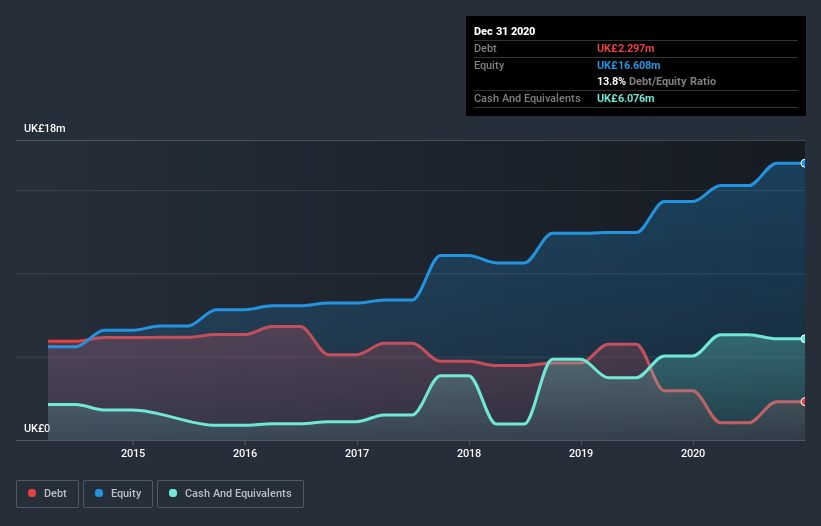David Iben put it well when he said, 'Volatility is not a risk we care about. What we care about is avoiding the permanent loss of capital.' When we think about how risky a company is, we always like to look at its use of debt, since debt overload can lead to ruin. Importantly, Tandem Group plc (LON:TND) does carry debt. But should shareholders be worried about its use of debt?
When Is Debt Dangerous?
Debt assists a business until the business has trouble paying it off, either with new capital or with free cash flow. In the worst case scenario, a company can go bankrupt if it cannot pay its creditors. However, a more common (but still painful) scenario is that it has to raise new equity capital at a low price, thus permanently diluting shareholders. By replacing dilution, though, debt can be an extremely good tool for businesses that need capital to invest in growth at high rates of return. When we think about a company's use of debt, we first look at cash and debt together.
View our latest analysis for Tandem Group
What Is Tandem Group's Net Debt?
As you can see below, Tandem Group had UK£2.06m of debt at December 2020, down from UK£2.95m a year prior. However, it does have UK£6.08m in cash offsetting this, leading to net cash of UK£4.02m.

How Healthy Is Tandem Group's Balance Sheet?
We can see from the most recent balance sheet that Tandem Group had liabilities of UK£10.9m falling due within a year, and liabilities of UK£4.89m due beyond that. On the other hand, it had cash of UK£6.08m and UK£9.97m worth of receivables due within a year. So its total liabilities are just about perfectly matched by its shorter-term, liquid assets.
This state of affairs indicates that Tandem Group's balance sheet looks quite solid, as its total liabilities are just about equal to its liquid assets. So it's very unlikely that the UK£32.1m company is short on cash, but still worth keeping an eye on the balance sheet. Succinctly put, Tandem Group boasts net cash, so it's fair to say it does not have a heavy debt load!
In addition to that, we're happy to report that Tandem Group has boosted its EBIT by 37%, thus reducing the spectre of future debt repayments. The balance sheet is clearly the area to focus on when you are analysing debt. But you can't view debt in total isolation; since Tandem Group will need earnings to service that debt. So if you're keen to discover more about its earnings, it might be worth checking out this graph of its long term earnings trend.
But our final consideration is also important, because a company cannot pay debt with paper profits; it needs cold hard cash. While Tandem Group has net cash on its balance sheet, it's still worth taking a look at its ability to convert earnings before interest and tax (EBIT) to free cash flow, to help us understand how quickly it is building (or eroding) that cash balance. Over the most recent three years, Tandem Group recorded free cash flow worth 63% of its EBIT, which is around normal, given free cash flow excludes interest and tax. This cold hard cash means it can reduce its debt when it wants to.
Summing up
While it is always sensible to investigate a company's debt, in this case Tandem Group has UK£4.02m in net cash and a decent-looking balance sheet. And we liked the look of last year's 37% year-on-year EBIT growth. So we don't think Tandem Group's use of debt is risky. There's no doubt that we learn most about debt from the balance sheet. However, not all investment risk resides within the balance sheet - far from it. Case in point: We've spotted 1 warning sign for Tandem Group you should be aware of.
At the end of the day, it's often better to focus on companies that are free from net debt. You can access our special list of such companies (all with a track record of profit growth). It's free.
If you decide to trade Tandem Group, use the lowest-cost* platform that is rated #1 Overall by Barron’s, Interactive Brokers. Trade stocks, options, futures, forex, bonds and funds on 135 markets, all from a single integrated account. Promoted
Valuation is complex, but we're here to simplify it.
Discover if Tandem Group might be undervalued or overvalued with our detailed analysis, featuring fair value estimates, potential risks, dividends, insider trades, and its financial condition.
Access Free AnalysisThis article by Simply Wall St is general in nature. It does not constitute a recommendation to buy or sell any stock, and does not take account of your objectives, or your financial situation. We aim to bring you long-term focused analysis driven by fundamental data. Note that our analysis may not factor in the latest price-sensitive company announcements or qualitative material. Simply Wall St has no position in any stocks mentioned.
*Interactive Brokers Rated Lowest Cost Broker by StockBrokers.com Annual Online Review 2020
Have feedback on this article? Concerned about the content? Get in touch with us directly. Alternatively, email editorial-team (at) simplywallst.com.
About AIM:TND
Tandem Group
Designs, develops, distributes, and retails of sports, leisure, and mobility products in the United Kingdom.
Excellent balance sheet with low risk.
Market Insights
Community Narratives



